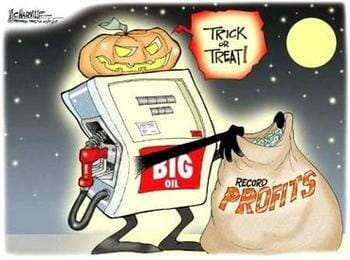 Yesterday we were invited by the Parliamentary Environmental Audit Committee (EAC) to come in and give evidence as part of their inquiry into the nature of energy subsidies in the UK. We’d already made a written submission, but it was great to go in and put our points across in person. Great, and a little bit daunting. There’s always an intimidating power dynamic to negotiate with these things, especially when Emma Hughes, the person from Platform who knows the most about the subject, was the only woman on a panel of much older men, mainly coming from the various relevant industries. It didn’t help matters that when waiting outside the other menfolk from the panel seemed to form one of those spontaneous “matey huddles” of guys talking to each other.
Yesterday we were invited by the Parliamentary Environmental Audit Committee (EAC) to come in and give evidence as part of their inquiry into the nature of energy subsidies in the UK. We’d already made a written submission, but it was great to go in and put our points across in person. Great, and a little bit daunting. There’s always an intimidating power dynamic to negotiate with these things, especially when Emma Hughes, the person from Platform who knows the most about the subject, was the only woman on a panel of much older men, mainly coming from the various relevant industries. It didn’t help matters that when waiting outside the other menfolk from the panel seemed to form one of those spontaneous “matey huddles” of guys talking to each other.
There’s a crucial battle to be had over the definition of what constitutes an energy subsidy, and we were there to try and ensure that some of the more subtle or ‘indirect’ subsidies from the government to the fossil fuel industry were recognised as such. Our submission looked at three main areas of ‘hidden’ subsidy – the military support that’s often provided (and lobbied for) to oil and gas industry operating in sensitive areas, the diplomatic subsidy involved in all manner of Foreign Office and other government agencies promoting the interests of the carbon sector abroad, and also the export credit subsidies – the fact that the government via UK Export Finance (which used to be the ECGD) acts as an underwriter for all manner of carbon-intensive infrastructure projects abroad.
Even without looking at the broader definition of subsidies, the vast amount of energy subsidies in the UK are going to the fossil fuel sector rather than to renewables. The Oxford Energy Associates report commissioned by the EAC showed that the Government puts over £15bn of annual subsidies into its energy sector, over 80% of which go to non-renewable energy sources.

The oil industry, represented on the panel by David Odling, the Energy and Policy Manager of lobby group Oil & Gas UK, are arguing for a much more narrow definition of what constitutes a subsidy, so narrow in fact that in a previous meeting another of their representatives had claimed that they “enjoy no subsidy from the government.” Their argument is basically that they pay so much more tax than any other sector in the UK on North Sea oil and gas drilling, so that even when they get awarded massive tax breaks from Osborne like they have done in recent years, they’re still paying way too much tax.
This was their main thrust from the get go, with David Odling, relatively unprompted taking it on himself to give a lengthy explanation of the various tax regimes imposed on North Sea production above and beyond the usual levels of corporation tax. Emma was quick to point out there is a special tax regime for hydrocarbons in the UK (ring-fenced corporation tax, petroleum revenue tax etc) but it’s not legitimate for UK Oil & Gas to add these special taxes into the overall industry tax bill and then say “this is a high-taxed industry so we are not being subsidised.” Those taxes reflect the fact that the fossil fuel companies have been granted a right to exploit a scarce UK natural resource and the taxes are essentially a redistribution of economic rent from the oil and gas companies to the taxpayer. The comparison of how heavily taxed the energy sector is compared with other sectors should exclude these special taxes because they arise due to the special circumstances of natural resource ownership.
Zac Goldsmith MP suggested that David Odling was being “misleading” in going on so much about the different tax regimes they were under when it essentially constituted a licence to extract the UK’s natural resources, while Emma also pointed out the Friends of the Earth research showing that the tax breaks given out in financial year 2012/13 are worth a total of £1.952 billion, over five years, to the oil and gas industry.
It wasn’t our only point of disagreement with Oil & Gas UK. When Emma referred to the 2009 G20 agreement to phase out fossil fuel subsidies by 2020, David Odling claimed this was only relevant for countries where fossil fuel subsidies are prevalent, citing Indonesia as an example. But then Emma pointed out that data from the Organisation for Economic Co-operation and Development (OECD) suggests subsidies for the UK’s fossil fuel industry increased by £500 million between 2010 and 2011 – and that’s not even including those subsidies from the broader definition.
The final point that we made, and what the committee seemed particularly interested in was how export credit guarantees by UKEF (UK Export Finance) to fossil fuel projects abroad was also a subsidy that needed to be taken into account. UKEF offers billions of pounds of public money every year as credit lines and insurance for UK companies exporting overseas – including guarantees for fossil fuel projects. – such as the $1 billion credit line for ultra deep drilling by Brazil’s state oil company Petrobras. If you look at what the OECD and International Energy Agency include in their definition of a subsidy, export credit guarantees are included and categorised as subsidies. A guarantee is a very specific type of subsidy and there are methodologies to estimate the size and the value of guarantees in the subsidy space.
UKEF have only conducted impact assessments (including environment and human rights) in 6 of the 26 loans for energy projects they have guaranteed. This is because the OECD Common Approaches do not require any impact assessment if the support is a ‘project bond’ rather than an export credit, if the loan is for less than 2 years, or if the loan is for less than around £10 million. In the most recent annual report, only 3 per cent of all loan guarantees had to be assessed under the Common Approaches. This means most loans they guarantee are for projects which they have not made any assessment of.
Subsidies shouldn’t be a dirty word. They’re an economic and political tool, and it’s a question of how that tool gets used. As Alan Simpson (who made excellent contributions during the hearing) said in his submission:
Britain gets poor value from the elaborate web of energy market subsidies it operates; subsidising the past rather than the future, old technologies rather than new, the unsustainable rather than the sustainable, and a closed cartel in preference to a more open energy democracy. The current subsidy framework acts as a roadblock to market transformation, rather than a pathway to it. Energy market subsidies should be measured against their ability to transform rather than maintain. All energy market subsidies (including tax exemptions and credits) are market distorting. This is neither a vice nor a virtue. What matters is their contribution to market transformation.
Thank you to Tim Jones of Jubilee Debt Campaign and Howard Reed of Landman Economics for their help and advice in preparing for this session.
@powellds: Good fun at EAC ‘Subsidies’ hearing today. Nuclear, oil and gas got bashed; forced to agree hidden subsidies are still subsidies.
— Alan Simpson (@AlanSimpson01) October 23, 2013